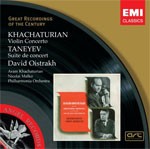Violin Concerto in D minor
(Konzert für Violine und Orchester d-moll) (1940)2.picc.2.corA.2.2-4.3.3.1-timp.perc-harp-strings
Abbreviations (PDF)
VAAP
<DIR=LTR align="left">In 1939 Khachaturian heard first-hand for the first time Armenian folk music and singing, elements of which infused the melodic writing in his Violin Concerto composed the following year. Working closely with the Soviet Union’s star violinist David Oistrakh, he completed the Concerto in just over two months in the summer of 1940. Much of the work’s character was enhanced by Oistrakh’s suggestions; indeed, the violinist rejected Khachaturian’s original long cadenza in the first movement, replacing it with a masterfully composed version of his own.
Possibly due to its direct, lively and melodious character, Khachaturian’s Concerto has all too routinely been underestimated. Yet for all its ebullience, most apparent in the opening and final movements, melancholy never seems far away. Perhaps the Concerto’s heart is to be found in the twilight world of the central Andante sostenuto, one of whose themes derives from a funeral song Khachaturian originally composed for the film Zangezur (1938). For all its bitter-sweet quality and the cool Gymnopédie-style opening, there is a sense of grief that is finally unassuageable, met with a strikingly bleak ending as the soloist’s final sustained A flat remains at odds with the orchestra’s chillingly implacable A minor descent. Yet the work ends with one of the most ebullient finales in concerto literature. No wonder the Concerto became so popular during World War Two, its mournful slow movement speaking so eloquently to a people resisting a brutal invasion, followed by this brisk and ultimately optimistic conclusion.
Note by Daniel Jaffé

David Oistrakh (violin); Philharmonia Orchestra/Aram Khachaturian
EMI 361 5702
Buy this CD from Amazon
